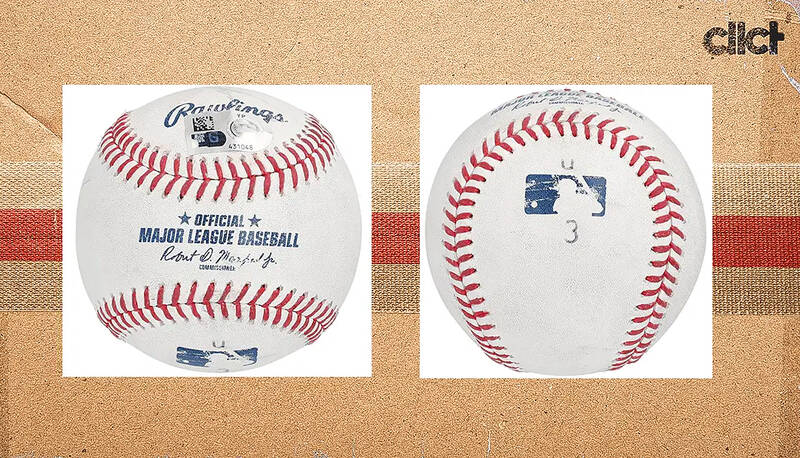The Taiwanese company that won the auction for the 50th home run ball hit by Los Angeles Dodgers superstar slugger Shohei Ohtani would be exempt from paying customs duty on it, the Ministry of Finance said yesterday.
The ball, which Ohtani hit out of the park to become the first player in Major League Baseball to hit 50 home runs and steal 50 bases in one season, was purchased earlier this month by the Taiwanese private investment firm UC Capital Ltd (優式資本) for US$4.392 million.
Imported baseballs are typically subject to customs duties of 3.3 percent to 10 percent, with a rate of 3.3 percent assessed for balls from the US, a Customs Administration official said in a statement.

Photo: AP
However, because of its historical significance, Ohtani’s 50th home run ball would qualify for an exemption for valuable collectibles classified under section 9705.10 of the Harmonized Commodity Description and Coding System, the official said.
The Harmonized System is a code used by most countries as a basis for their customs tariffs and the collection of trade statistics. Section 9705.10 refers to “collections and collectors’ pieces of archeological, ethnographic or historical interest.”
In terms of international precedents, French customs authorities used section 9705.10 of the system to classify the importation of a pair of shoes that US basketball star LeBron James wore during the 2005-2006 National Basketball Association season, the agency said.

Photo grab from Goldin Auctions website
Despite the customs duty exemption, UC Capital would likely still have to pay the 5 percent sales tax on the purchase, equivalent to about NT$7 million (US$218,062), the Ministry of Finance said.
Officials are still looking into the possibility that the ball is covered under Article 49 of the Customs Act (關稅法) — which applies to items ranging from diplomatic gifts to relief supplies — in which case it would also be exempt from the sales tax, the ministry said.

To many, Tatu City on the outskirts of Nairobi looks like a success. The first city entirely built by a private company to be operational in east Africa, with about 25,000 people living and working there, it accounts for about two-thirds of all foreign investment in Kenya. Its low-tax status has attracted more than 100 businesses including Heineken, coffee brand Dormans, and the biggest call-center and cold-chain transport firms in the region. However, to some local politicians, Tatu City has looked more like a target for extortion. A parade of governors have demanded land worth millions of dollars in exchange

An Indonesian animated movie is smashing regional box office records and could be set for wider success as it prepares to open beyond the Southeast Asian archipelago’s silver screens. Jumbo — a film based on the adventures of main character, Don, a large orphaned Indonesian boy facing bullying at school — last month became the highest-grossing Southeast Asian animated film, raking in more than US$8 million. Released at the end of March to coincide with the Eid holidays after the Islamic fasting month of Ramadan, the movie has hit 8 million ticket sales, the third-highest in Indonesian cinema history, Film

Taiwan Semiconductor Manufacturing Co’s (TSMC, 台積電) revenue jumped 48 percent last month, underscoring how electronics firms scrambled to acquire essential components before global tariffs took effect. The main chipmaker for Apple Inc and Nvidia Corp reported monthly sales of NT$349.6 billion (US$11.6 billion). That compares with the average analysts’ estimate for a 38 percent rise in second-quarter revenue. US President Donald Trump’s trade war is prompting economists to retool GDP forecasts worldwide, casting doubt over the outlook for everything from iPhone demand to computing and datacenter construction. However, TSMC — a barometer for global tech spending given its central role in the

Alchip Technologies Ltd (世芯), an application-specific integrated circuit (ASIC) designer specializing in server chips, expects revenue to decline this year due to sagging demand for 5-nanometer artificial intelligence (AI) chips from a North America-based major customer, a company executive said yesterday. That would be the first contraction in revenue for Alchip as it has been enjoying strong revenue growth over the past few years, benefiting from cloud-service providers’ moves to reduce dependence on Nvidia Corp’s expensive AI chips by building their own AI accelerator by outsourcing chip design. The 5-nanometer chip was supposed to be a new growth engine as the lifecycle